|
|
|
Sort Order |
|
|
|
Items / Page
|
|
|
|
|
|
|
| Srl | Item |
| 1 |
ID:
004531


|
|
|
|
|
| Publication |
Washington DC, Woodrow Wilson Center, 1993.
|
| Description |
14p.
|
| Series |
Woodrow wilson center Asia program occasional paper; no.56
|
|
|
|
|
|
|
|
|
|
|
|
Copies: C:1/I:0,R:0,Q:0
Circulation
| Accession# | Call# | Current Location | Status | Policy | Location |
| 035362 | 325.51/SOL 035362 | Main | On Shelf | General | |
|
|
|
|
| 2 |
ID:
085907
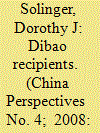

|
|
|
|
|
| Publication |
2008.
|
| Summary/Abstract |
After the Chinese leadership became cognizant of the negative social externalities of marketization-especially potential threats to its hallowed objectives of social stability and successful state enterprise reform-it initiated a novel welfare approach.
|
|
|
|
|
|
|
|
|
|
|
|
|
|
|
|
| 3 |
ID:
154156
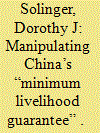

|
|
|
|
|
| Summary/Abstract |
In 1999, the State Council set forth an urban social assistance program aimed chiefly at pacifying protesting laid-off workers and compensating for the breakdown of the work-unit-based welfare benefits that had obtained under the planned economy. While an initial goal was to ensure the political stability that would allow enterprise reform to proceed unchallenged, over time the content of the scheme shifted in line with new regime goals. First the program spread to the countryside, as the New Socialist Countryside model was installed. In the past few years, in line with a tightening of financial commitment, leaders have demanded that the able-bodied poor should work, not be succoured, and that the program’s allowances target the desperate. Also, beginning in 2014 and continuing into 2016 there has been heavy emphasis on fighting graft and corruption in the program. The paper details five alterations that have emerged – or policy slants for which earlier, less extreme changes in implementation have intensified – since Xi Jinping ascended to power. The big message here is that the regime has repeatedly reshaped this initiative to match the changing political agenda of the Party.
|
|
|
|
|
|
|
|
|
|
|
|
|
|
|
|
| 4 |
ID:
114801
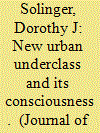

|
|
|
|
|
| Publication |
2012.
|
| Summary/Abstract |
This paper investigates whether the 22 million or so urban recipients of the Minimum Livelihood Guarantee (the zuidi shenghuo baozhang), whose per capita family income falls below a locally set poverty line, can be called a 'class'. It also explores if they experience 'class consciousness'. It draws on theoretical writings on class and class consciousness, and on some seven dozen unstructured interviews in households of urban dibao recipients in Lanzhou, Guangzhou, Wuhan, and three smaller Hubei cities in 2007-2010, mainly using material from 2010. It finds that, unlike the former working class, while these people do not comprise a 'class' as such, their consciousness of their plight, stripped bare of all the illusions that clouded it in Maoist times-again as distinguished from the bygone working class-is more faithful to their actual circumstances than it is specious.
|
|
|
|
|
|
|
|
|
|
|
|
|
|
|
|
| 5 |
ID:
048395
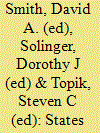

|
|
|
|
|
| Publication |
London, Routledge, 1999.
|
| Description |
xv, 288p.
|
| Standard Number |
0415201195
|
|
|
|
|
|
|
|
|
|
|
|
Copies: C:1/I:0,R:0,Q:0
Circulation
| Accession# | Call# | Current Location | Status | Policy | Location |
| 041618 | 337/SMI 041618 | Main | On Shelf | General | |
|
|
|
|
| 6 |
ID:
119703


|
|
|
|
|
| Publication |
2013.
|
| Summary/Abstract |
The Chinese Communist Party has been suspicious of people engaged in commercial activity on the streets ever since it took over the country in 1949, but the reasons for this have shifted in a paradoxical way over the decades. In the years when Mao Zedong ruled the nation according to his understandings and beliefs about socialist values and for several years after his death the suspicion in the main concerned the capitalist practices that business entails-profit making, inequalities, price-consciousness, class differentiation. Except for a few short intervals, doing non-state trade or providing private services was banned. In the first few decades after 1980, marketing outside was treated more leniently, although paying fees and purchasing licenses were still required in order to avoid harassment, and peasant migrants faced challenges. But once millions of people were laid off after 1995, the Party hoped to enable them to make a living, and also to prevent them from protesting, so it gave them special leeway to work outside from stalls and even directly on the pavement. After the mid 2000s, however, the indigent-the majority of whom were probably once members of the ideologically sacrosanct proletariat-have, ironically (in light of the values of the past) been discouraged from appearing on city streets to make money. Thus now that capitalist activity is common, the impoverished are considered to damage the city appearance, so that instead of capitalism being banned, it is the interests just of large-scale moneymakers that are to be served.
|
|
|
|
|
|
|
|
|
|
|
|
|
|
|
|
| 7 |
ID:
119185
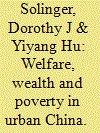

|
|
|
|
|
| Publication |
2012.
|
| Summary/Abstract |
In the broader social science literature, most studies of social protection investigate welfare in democracies, and at the national level, and typically assume that welfare is given in order to influence voting. This paper, to the contrary, considers social assistance in authoritarian China at the urban level. Its findings are compatible with an explanation that there are two dissimilar logics influencing the distributional decisions of lower-level administrators. That is, there appear to be two modes of social policy implementation, which vary with the fiscal capacity of a given city, as indicated by its average wage: Wealthier cities seem to prefer to push off the streets those viewed as unsuited to a modern city, therefore allocating a substantial proportion of their social assistance funds to them, in order to entice them to stay at home. On the other hand, poorer places seem to permit such people to work outside, in the hope that they will thus be better able to support themselves, thereby saving the city money. A data set from China's Ministry of Civil Affairs was used.
|
|
|
|
|
|
|
|
|
|
|
|
|
|
|
|
|
|
|
|
|